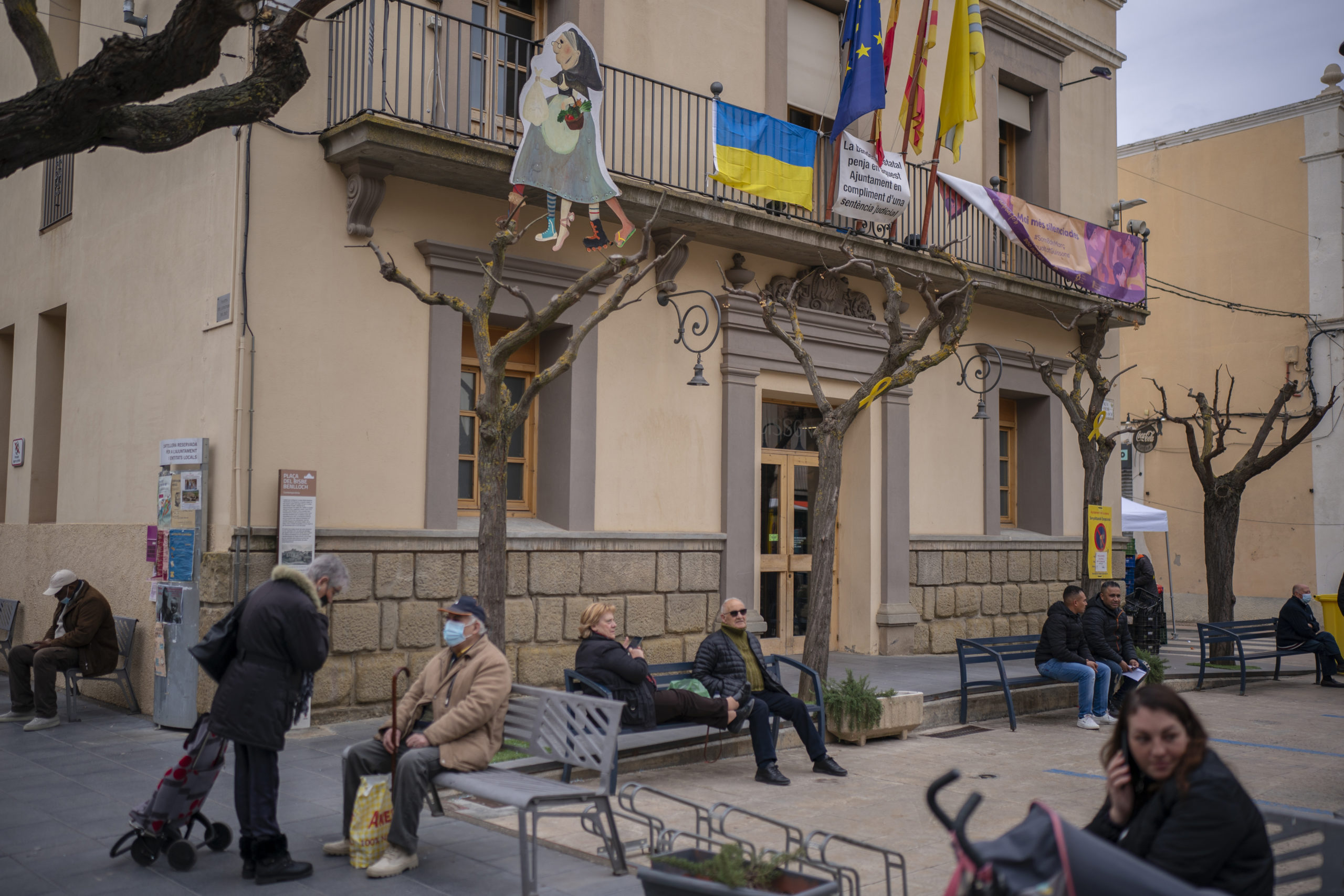GUISSONA, Spain (AP) — As Ukrainian refugees fleeing bombs and bullets at home fan out across Western Europe, few places they arrive feel as welcoming as a Spanish town known for years as “Little Ukraine.”
Even before Russian tanks rolled into Ukraine last month, one in seven residents of Guissona was originally from there. Guissona’s population more than doubled to around 7,500 residents, and drew in a lot of immigrant labor, including the Ukrainians, after a regional supermarket chain opened a distribution center nearby two decades ago.
More than 3.5 million people have already fled Russia’s war in Ukraine. The refugees are finding safe havens in small communities on the continent where family and friends who went to find work have put down roots.
In Guissona, refugees aren’t just staying with their relatives. Familiarity with the Ukrainian community bred local sympathy for the refugees’ plight, and Spaniards are making room for them too.
Miquel Julia, a local businessman, had an empty apartment for sale in the town. He says he’s made many Ukrainian friends in recent years, and when a local cousin of a Ukrainian refugee family asked him for help, he handed them the apartment until it’s safe for them to go back home.
He couldn’t turn a blind eye to the desperate refugees, he says.
“Bad times. Even more so when you see the state in which they arrive, and the stories they bring with them,” he said.
He has lent his apartment to Alona Hrykun, a 44-year-old seamstress from Kyiv, who recently arrived with her teenage daughter and small son.
“My husband stayed behind in Kyiv. He is an ambulance driver and is helping move injured and sick people during the invasion,” Hrykun said. “I am so proud of being Ukrainian.”
Beside her husband, Hrykun left behind her mother and grandmother. Both were physically unable to make the trip of around 2,500 kilometers (1,500 miles) from one side of Europe to the other.
Authorities in Guissona, in northeast Spain’s Catalonia region, have worked hard to avoid the creation of ghettos and to help foreign workers integrate into the community.
Many of the town’s windows and balconies, including at the town hall, are currently draped with Ukrainian flags and antiwar posters and banners.
More than 200 Ukrainian refugees have arrived in Guissona so far. They are part of the around 25,000 who have sought refuge in Spain.
“They are getting our full support. They feel protected,” says Guissona retiree Maria Angels Lopez, who is 67. “We all make the effort to help them and be with them. To stand in solidarity with them.”
Every day since the onset of the war, dozens of locals and newly arrived refugees work at a Guissona warehouse filling boxes with food, medicines, clothes, blankets and toys to be sent to Ukraine.
Among the volunteers is Alina Slobodianiuk, who arrived here three days ago with her teenage son Maxim and daughter Yana.
They lived in the industrial Ukrainian city of Dnipro where she worked as a public relations specialist at a leading Ukrainian bank. Slobodianiuk is divorced and her ex-husband is a soldier.
She’s left most of her family behind, including her parents, brother and sister. She says they’re in contact every day, but that her family opted to stay in the hope that the war will end soon.
“It wasn’t an easy decision. Because I love my country. I really love Ukraine,” Slobodianiuk said. “But I am afraid for my kids.”
The Spanish government was one of the first to adopt special European Union measures in response to the wave of refugees.
Among the temporary measures, refugees fleeing the war in Ukraine are given temporary residency and work permits within 24 hours.
Refugees also have access to public health care, discounted medicine and free schooling, among other benefits.
Just over 115,000 Ukrainian citizens were living in Spain last year, according to the 2021 census.
The web of contacts through Ukrainian immigrants is working elsewhere in Europe too.
In a village in Italy’s Apennine Mountains, an hour’s drive from Rome, two Ukrainian women who fled with their small children have found peace thanks to family ties and a local couple.
Tania, 30, and Katia, 33, fled the Ukrainian city of Lviv a few days after the outbreak of the war, leaving their husbands behind. They are the daughter and daughter-in-law of Halyna, a Ukrainian carer who lives in the village of Belmonte Sabino.
Halyna used to look after the mother-in-law of a local hotel owner, and he is now putting up the two women and their children.
“We are really happy. The Italian people have a big heart,” said Tania, who said she was grateful to the inhabitants of Belmonte Sabino, all of whom they now consider friends.
The Ukrainian women asked that their last names not be used, for fear of reprisals against family in their home country.
___
Barry Hatton in Lisbon, Portugal, contributed to this report.

